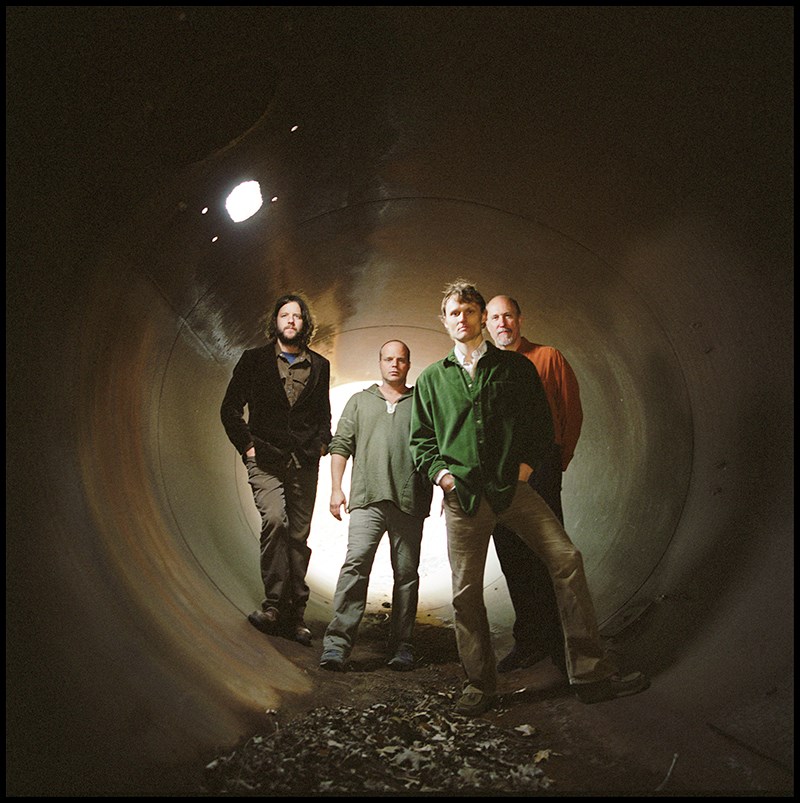Of the communal tropes Vancouverites share – soaring rent, a yoga mat, or an opinion on bike lanes – a shelf in a living compartment suffering under the crushing weight of flyers for some variant of “My Friend’s Band” should be near the tip of the tongue for conversations with strangers. To not know someone who doesn’t at least own a guitar – let alone plays in six bands – is to be the victim of a cultural con in which you are deprived of the privilege of being stowed away at a concert like a piece of superfluous, albeit very stylish, luggage in the forgotten recesses of a ship’s hold.
Music culture is still, even in these homogenized times, comprised of tribes distinguished by proprietary cultural practices. For instance, while we may be paralyzed with hushed awe at the sophisticated courtship rituals of Funky Winkerbean metalheads, our understanding of them would remain a shallow one without being able to appreciate the spectacle that is a shirtless man hurling himself off a stage with a pitcher of beer in each hand.
However, music has the distinct advantage of not drowning those who touch down at it’s lowest fathoms. There’s no telling what you might discover if you dive deep enough and unlike drowning, there’s a certain joy to be found in feeling the tendrils of the sea drag you deeper.
Jazz in particular seems to have a reputation of consuming its fans and stymieing it’s detractors; you can seemingly either drop into it like a stone or skip across it like a chestnut.
But there is an enviable space in between for groups like Medeski Martin & Wood to inhabit. They trace their musical lineage to a place where jazz mashes it’s orifices together with hip hop and the jam bands of the ‘60s and ‘70s. Their inimitable groove is the undercurrent for melody and harmony that run the gamut from sweet, serene, to strange. A longtime collaboration with guitarist John Scofield has been the subject of much midnight jazz school reverence but has also established them a broader appeal due to a mutual taste for groove that’s expertly incendiary when dropped on a dance floor.
“We have a lot of the same influences and aesthetic,” explains bassist, Chris Wood. “Scofield is a little older than us but somehow aspires to the same things and has the same rhythmic inspiration. Like us, he’s into R&B groove music; but then of course he’s into jazz, has played with Miles, and has this incredible range of influences. So it’s pretty much the same as MMW. It’s a good match.”
Wood and his bandmates are putting some finishing touches on a new album with the elder axeman that’s slated to be released this September and to be featured on their upcoming tour which drops anchor in Vancouver on June 20. Juice is a collection of new songs by Scofield and covers of old faithfuls by Bob Dylan and Cream which Chris describes off-cuff as, “Boogaloo and Latin music with some funky jazz”.
In order to communicate MMW to a print audience, music journalists have stenciled the group with a variety of labels from the accurate but deceptive, “free-jazz” to the asinine and why-bother tagline, “post-jazz”. Word cocktails seem to leave out either the baby or the bath water.
“For us, it’s more accurately called spontaneous composition, because what we want to do is create something that has a beginning, has a shape, and has an ending so it actually is a composition,” says Wood. “We just happen to be making it up on the spot.”
Clutching an unbelievable variety of musical pearls, the most defining part of MMW seems to be a commitment to improvisation as an art-form. All three musicians are notoriously busy and throughout the melee they’ve been inexhaustible champions of spontaneous music-making.
However, their concerts don’t have any of what Glenn Gould called, “the bloodsport” of live performance. Rather than a contest where someone is declared winner by being drowned in a sheath of undergarments thrown from an adoring crowd, MMW seeks to simultaneously feed off of and be fed by their audience like a cabal of equal opportunity jazz vampires. Sometimes, this can mean that the tremor of a dance floor is what feeds the group. At other times, it can be more subtle and nuanced.
“When we feel a real connection to the audience... there is some movement,” Wood explains. “But there are also other times when it’s seeing what’s going to happen next, listening, and appreciating what someone’s playing at that moment. So it’s kind of like a journey. Classical music does that. It takes you on a journey and tells a story. There’s the cyclical dance aspect but there’s a linear aspect of starting here and we hope you’re going to follow us over there.”
It’s this almost mystical side to improvisation that keeps MMW and their audiences together. When the connection happens, and everyone is surprised at where it leads it’s hard to deny something special is going on. Wood intones lovingly that, “When that happens it’s so magical. Everything has to come together, everyone has to be tuned in.”
• Medeski Scofield Martin & Wood appear at the Vogue Theatre this Friday, June 20, as part of the TD Vancouver International Jazz Festival. NorthernTickets.com


